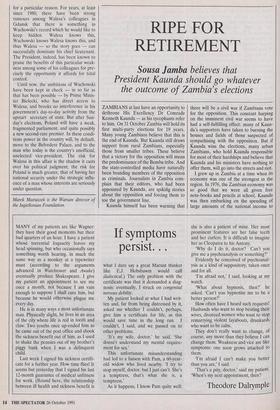If symptoms persist.. .
MANY of my patients are like Wagner: they have their good moments but their bad quarters of an hour. I have a patient whose torrential loquacity leaves my head spinning, but who occasionally says something worth hearing, in much the same way as a monkey at a typewriter must (according to the arguments advanced in Watchtower and Awake) eventually produce Shakespeare. I give my patient an appointment to see me once a month, not because I am vain enough to suppose I shall cure him, but because he would otherwise plague me every day.
He is in many ways a most unfortunate man. Physically slight, he lives in an area of the city where life is red in tooth and claw. Two youths once up-ended him as he came out of the post office and shook the sickness benefit out of him, as I used to shake the pennies out of my brother's piggy bank when I was a delinquent child.
Last week I signed his sickness certifi- cate for a further year. How time flies! It seems but yesterday that I signed his last 12-month guarantee of medical unfitness for work. (Round here, the relationship between ill health and sickness benefit is what I dare say a great Marxist thinker like E.J. Hobsbawm would call dialectical.) The only problem with the certificate was that it demanded a diag- nosis: eventually, I struck on congenital nervous debility.
My patient looked at what I had writ- ten and, far from being distressed by it, asked me whether I couldn't, perhaps, give him a certificate for life, as this would save time in the long run. I couldn't, I said, and we passed on to other problems.
`It's my wife, doctor,' he said. 'She doesn't understand my mental require- ment for sex.'
This unfortunate misunderstanding had led to a liaison with Pam, a 60-year- old widow who lived nearby. 'I try to stop myself, doctor, but I just can't. She's a temptress, that's what she is, a temptress.'
As it happens, I know Pam quite well: she is also a patient of mine. Her most prominent features are her false teeth and her curlers. It is difficult to imagine her as Cleopatra to his Antony.
`Why do I do it, doctor? Can't you give me a psychoanalysis or something?'
Evidently he conceived of psychoanal- ysis as a kind of suppository, taken once and for all.
`I'm afraid not,' I said, looking at my watch.
`What about hypnosis, then?' he asked. 'Can't you hypnotise me to be a better person?'
How often have I heard such requests! Husbands who want to stop beating their wives, divorced women who want to stop remarrying violent layabouts, drunkards who want to be calm.
They don't really want to change, of course, any more than they believe I can change them. Weakness and vice are like symptoms: one soon grows attached to them.
`I'm afraid I can't make you better than you are,' I said. `That's a pity, doctor,' said my patient. `When's my next appointment, then?
Theodore Dalrymple








































 Previous page
Previous page